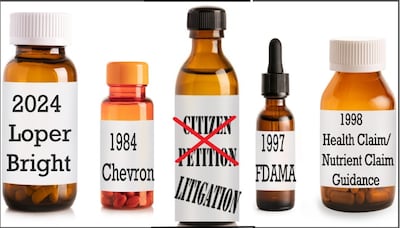Legal
Lawsuit filed in District of Columba federal court alleges FDA violated the authoritative statement provisions of FD&C Act, Constitutional Avoidance Doctrine and First Amendment by rejecting ANH-USA’s petition to allow 114 science-based health claims sourced directly from federal agencies.
FDA rejects petition asking for approval to use, as health claims for supplements, nutrient–disease statements drawn directly from government publications and public-facing materials produced by NIH, CDC and other federal health agencies.
CRN’s attorneys ask Second Circuit for en banc review of a three-judge panel’s denial of its appeal of 2024 decision in district court rejecting motion for preliminary injunction against enforcement of New York state law age-restricting sales of weight loss and muscle building supplements.
Three-judge Second Circuit panel rejects CRN’s argument that New York General Business Law Section 391-oo, effective since April 2024 as first in US to prohibit sales of certain supplements to consumers under 18, violates First Amendment rights of supplement marketers.
The Trump Administration may differ from the Biden Administration in some areas of health care antitrust enforcement, but experts said some Biden-era priorities may be maintained.
Filing references Second Circuit ruling on New York attorney general’s appeal of lower court’s finding that state’s laws on unauthorized practice of law unfairly limited services by nonprofit providing free legal advice to residents facing debt-collection actions.
“The knock on supplements is there's very little research that is done, and when it is done, it's done by industry funders, and they're often very small,” says plaintiffs’ attorney Timothy Blood.
Absence of a submitted structure/function claim for Joint Juice glucosamine/chondroitin supplement beverage among factors leading to plaintiffs’ wins in multiple class-action lawsuits against Premier Nutrition, says attorney representing plaintiffs in several complaints.
Alliance of Natural Health launches initiative to change FDA’s use of “significant scientific agreement” standard for allowing health claims with a citizen petition for approval of 118 nutrient-disease health claims.
UK regulator issues reminder that melatonin is a prescription-only medicine in the UK after the sleep aid is found in a dietary supplement for children.
Due to staff reductions at FDA ordered by DOGE, but accounting for return of some employees after their dismissals were rescinded, agency missed July 31 deadline it had set for responding to the NPA’s petition and expects to respond by Sept. 30.
After National Advertising Division attorneys, in a review prompted by a challenge by Band-Aid line marketer Kenvue, recommended ASO LLV cease use of its “up to 2x faster healing” claim, they determined the firm had not fully complied.
In complaint and response to motion to dismiss, Rebecca Kelly Slaughter’s and Alvaro Bedoya’s attorneys elaborate on Supreme Court ‘s 1935 decision, Humphrey’s Executor v. US. Administration attorneys, though, contend the ruling isn’t relevant to the current FTC.
Instead of arguing FDA’s not authorized to offer option under authority from 1958 Food Additives Amendments, potential litigation could contend the law requires agency to continue making self-GRAS without notification available.
In response to an IPA Europe complaint, European Ombudsman Emily O’Reilly finds that the Commission’s interpretation of EU food legislation in relation to probiotics is “reasonable and in line with the main goal of this legislation, which is to ensure a high level of consumer protection.”
Despite questions surrounding the SEC rule, including disputes being litigated in the US Eighth Circuit, companies must prepare to meet the new climate disclosure requirements in addition to related mandates in California and abroad. Experts emphasize opportunities beyond compliance.
Report from European Commission's Alert and Cooperation Network finds EU consumers are being deceived by companies marketing supplements making unauthorized health claims and containing unapproved ingredients.
The Supreme Court’s 6-3 ruling is expected to have a minimal impact on drug approvals and other scientific determinations, but matters steeped in the interpretation of regulation and statute, such as marketing exclusivity, could face a heightened risk of challenge, legal experts say.
Whether called “dark patterns,” “shady” online marketing practices, or simply deception on the internet, the issue has taken on high importance at the US Federal Trade Commission and is being tackled by new laws in a growing number of states. Amin Talati Wasserman partner Lauren Aronson discusses in this interview with HBW Insight.
BBB National Programs found FTC’s proposed Trade Regulation Rule on the Use of Consumer Reviews and Testimonials largely effective with some certainty on whether product reviews or customer testimonials are violations of its false advertising standards. But it =expects some clarifications may come in final rule.




















